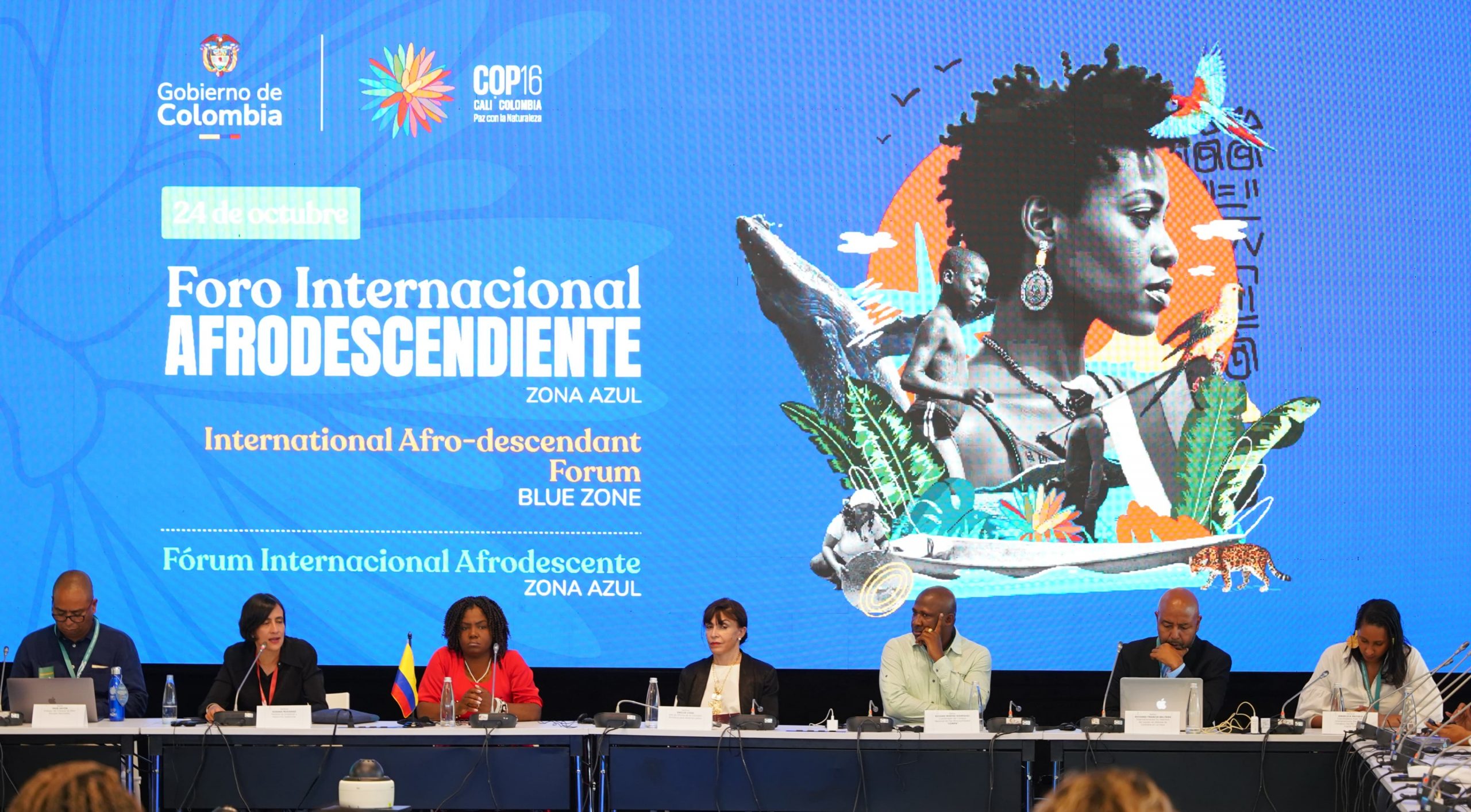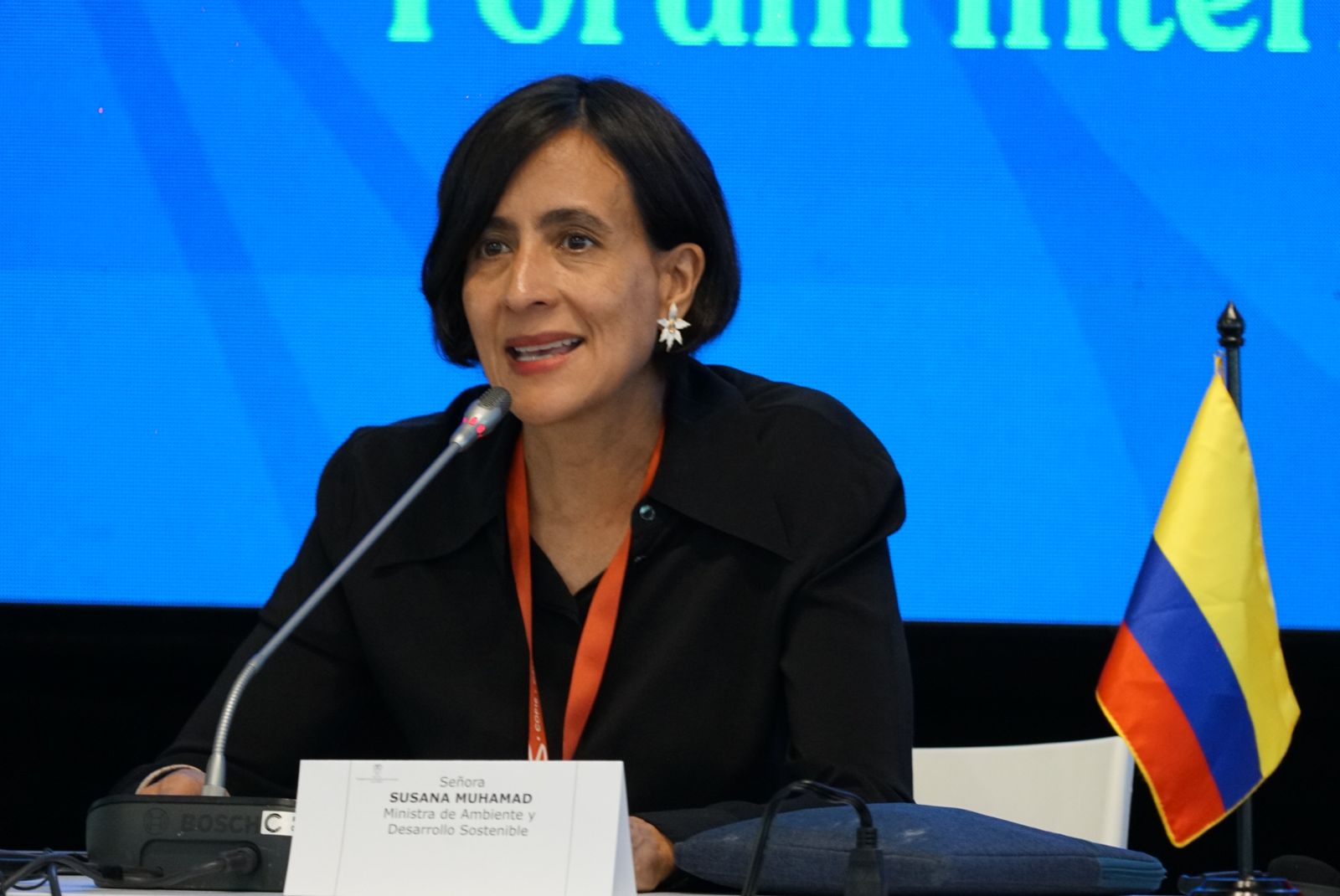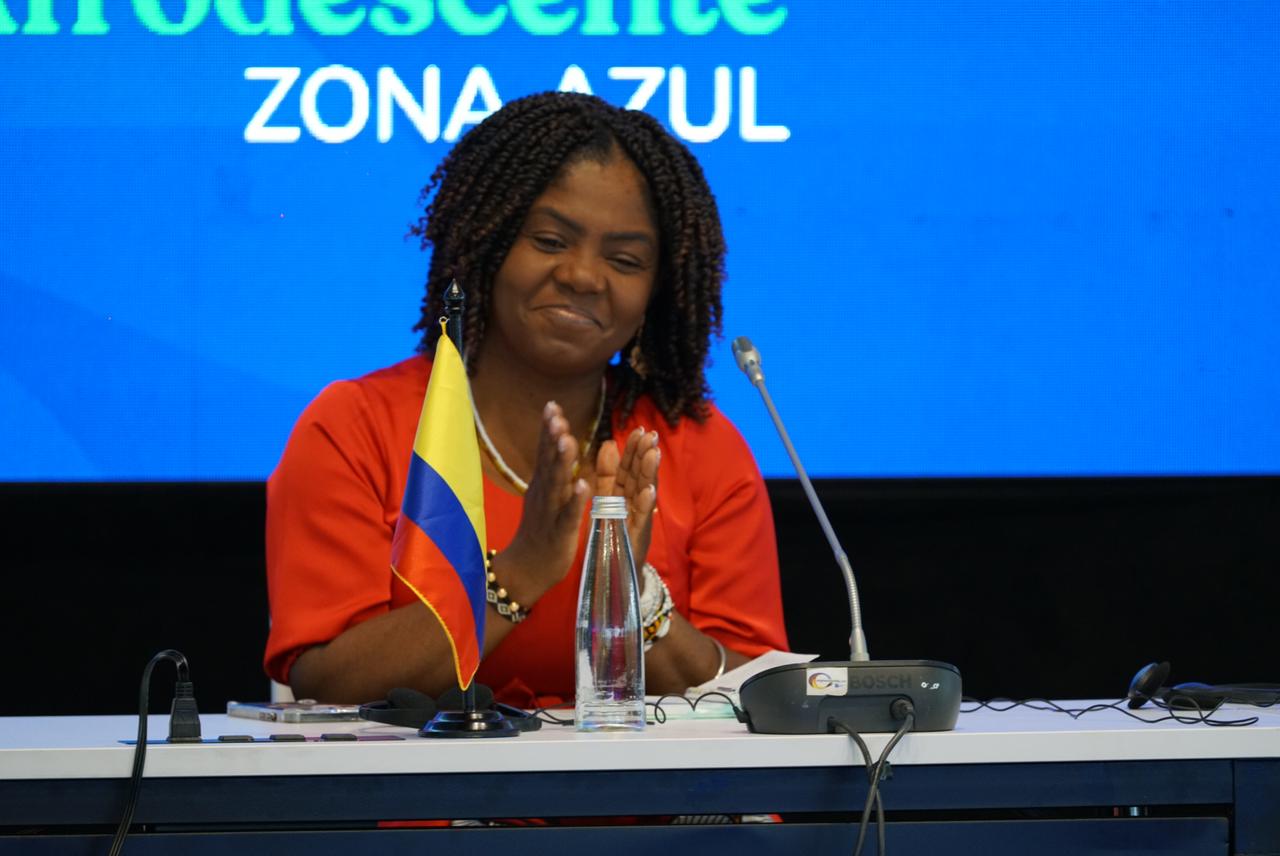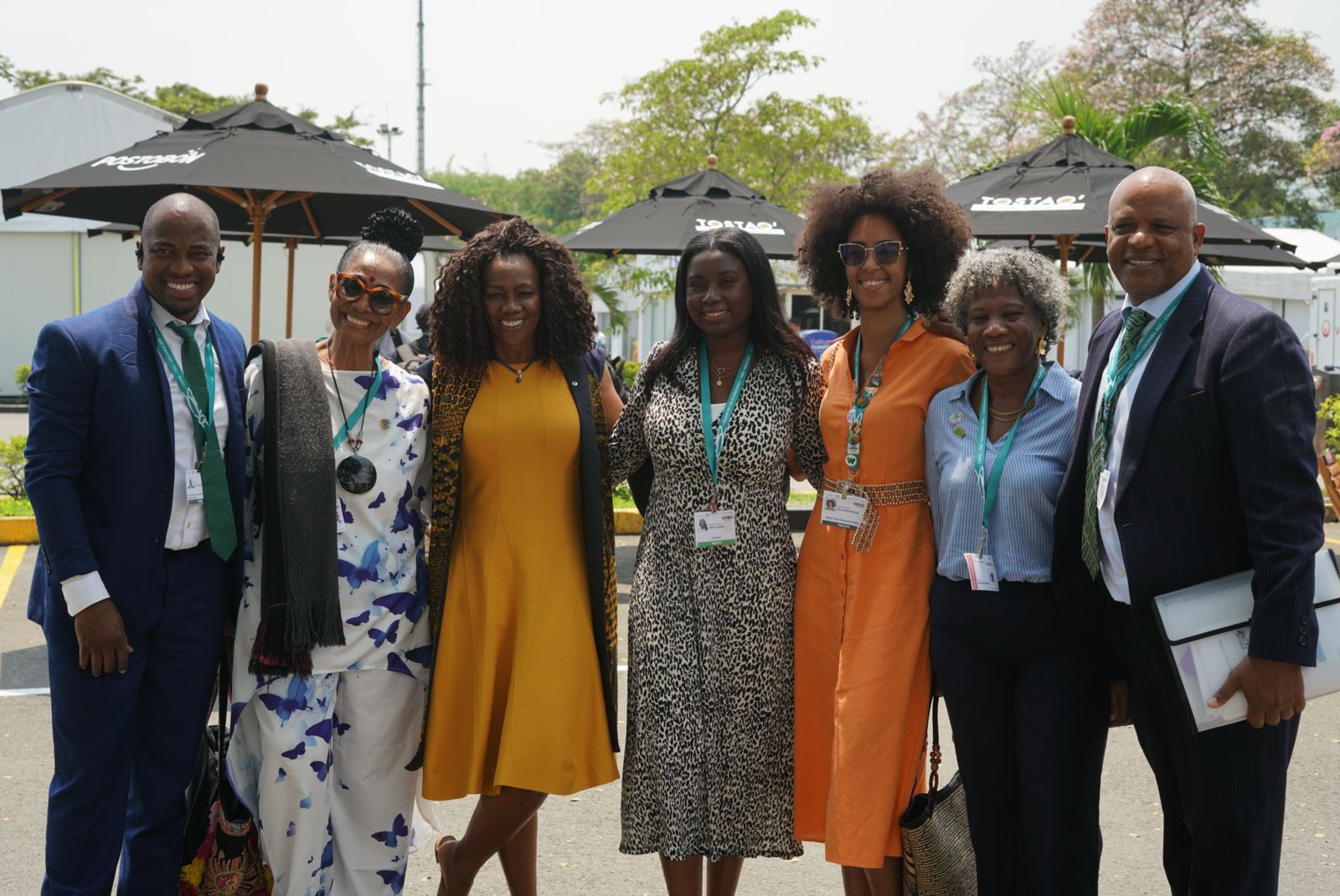Es necesario reconocer el aporte histórico de estas comunidades en la protección y conservación de la naturaleza: Minambiente

La ministra de Ambiente Susana Muhamad menciona que es necesario reconocer el aporte histórico de estas comunidades en la protección y conservación de la naturaleza. Foto COP16
Cali 24 octubre 2024_ RAM _ En la COP16 de biodiversidad se celebró por primera vez el Foro Internacional Afrodescendiente, un espacio histórico que ha reunido a líderes, representantes y activistas afrodescendientes de diferentes continentes del mundo para discutir su inclusión y reconocimiento dentro del Convenio de Diversidad Biológica. Este foro, respaldado por la Secretaría del Convenio, representa un hito en la lucha por la justicia racial, étnica y ambiental.
La ministra de Ambiente de Colombia, Susana Muhamad, destacó en su intervención la importancia de este espacio y su relevancia dentro de la COP16. “Es ya un hecho icónico que este foro oficial, respaldado por la Secretaría del Convenio de Diversidad Biológica, se esté llevando hoy aquí en la Zona Azul. Esto implica que el tema no es periférico, sino que, gracias al compromiso del pueblo negro de América Latina, este tema ha logrado estar presente como un asunto de negociación importante», afirmó Muhamad.

La ministra de Ambiente de Colombia, Susana Muhamad, destacó en su intervención la importancia de este espacio y su relevancia dentro de la COP16..Foto COP 16
La ministra también resaltó el papel crucial que han tenido los pueblos afrodescendientes en la conservación de la biodiversidad, recordando que las comunidades negras habitan ecosistemas estratégicos que aportan el 40% de la biodiversidad global. «No reconocer el aporte histórico de las comunidades negras a la biodiversidad es obviar una de las riquezas culturales y políticas más importantes», añadió Muhamad.

Por su parte, la vicepresidenta de Colombia, Francia Márquez, enfatizó en el trabajo arduo de los delegados afrodescendientes en las mesas de negociación.Foto COP16
Por su parte, la vicepresidenta de Colombia, Francia Márquez, enfatizó en el trabajo arduo de los delegados afrodescendientes en las mesas de negociación, señalando el liderazgo de Jenny Bowen, jefa de la delegación colombiana, y Tatiana Olmedo, una joven de 25 años que ha sido clave en la defensa de los derechos afrodescendientes dentro del convenio. «Este esfuerzo afrodescendiente es histórico y su presencia en este foro es un acto de reparación y justicia étnico-racial», expresó Márquez.
Carolina Rocha, historiadora de Brasil, también intervino destacando que “la organización del Foro es un momento histórico en la COP16, con debates y narrativas muy importantes para la lucha de los pueblos negros en América Latina y en todo el mundo”.
Josefina Klinger Zúñiga, directora de la Corporación Mano Cambiada, añadió: “Nosotros habitamos en los lugares más estratégicos donde la biodiversidad está. Este foro no solo es un espacio de diálogo, es una reivindicación para nuestras comunidades. Por fin, nuestras voces, nuestras luchas y nuestra relación con la naturaleza están siendo reconocidas a nivel global. Aquí estamos construyendo una nueva narrativa donde los pueblos afrodescendientes somos protagonistas de la conservación”.
El Foro Internacional Afrodescendiente en la COP16 marca un paso significativo hacia la inclusión de los pueblos afrodescendientes dentro de los procesos de toma de decisiones globales, reconociendo su papel fundamental en la protección y conservación de la biodiversidad mundial.
Failure to recognize the historical contribution of Afro-descendant communities to biodiversity is to ignore their cultural and political richness: Minister Muhamad

- For the first time, Afro-descendant communities have an official space at COP16 to discuss their role in biodiversity conservation.
- Minister of Environment Susana Muhamad mentions that it is necessary to recognize the historical contribution of these communities in the protection and conservation of nature.
- The participation of Afro-descendants in COP16 is a historic step towards the recognition of their rights and contributions within the Convention on Biological Diversity.
Cali 24 October 2024_ RAM _ The International Afrodescendant Forum was held for the first time at COP16 on biodiversity, a historic space that has brought together Afro-descendant leaders, representatives and activists from different continents of the world to discuss their inclusion and recognition within the Convention on Biological Diversity. This forum, supported by the Secretariat of the Convention, represents a milestone in the struggle for racial, ethnic and environmental justice.
Colombia’s Minister of Environment, Susana Muhamad, highlighted in her speech the importance of this space and its relevance within the COP16: “It is already an iconic fact that this official forum, supported by the Secretariat of the Convention on Biological Diversity, is being held here today in the Blue Zone. This implies that the issue is not peripheral, but that, thanks to the commitment of the black people of Latin America, this issue has managed to be present as an important negotiation issue,” said Muhamad.

For the first time, Afro-descendant communities have an official space at COP16 to discuss their role in biodiversity conservation..Foto COP16
The minister also highlighted the crucial role that Afro-descendant peoples have played in biodiversity conservation, recalling that black communities inhabit strategic ecosystems that contribute 40% of global biodiversity. “Not recognizing the historical contribution of black communities to biodiversity is to ignore one of the most important cultural and political riches,” added Muhamad.
For her part, the Vice President of Colombia, Francia Márquez, emphasized the hard work of the Afro-descendant delegates at the negotiating tables, noting the leadership of Jenny Bowen, head of the Colombian delegation, and Tatiana Olmedo, a 25-year-old who has been instrumental in defending Afro-descendant rights within the agreement. “This Afro-descendant effort is historic and their presence in this forum is an act of reparation and ethnic-racial justice,” said Márquez.
Carolina Rocha, historian from Brazil, also intervened highlighting that “the organization of the Forum is a historic moment at COP16, with very important debates and narratives for the struggle of black peoples in Latin America and around the world”.
Josefina Klinger Zúñiga, director of Corporación Mano Cambiada, added: “We live in the most strategic places where biodiversity is. This forum is not only a space for dialogue, it is a vindication for our communities. Finally, our voices, our struggles and our relationship with nature are being recognized globally. Here we are building a new narrative where Afro-descendant peoples are the protagonists of conservation”.
The International Afrodescendant Forum at COP16 marks a significant step towards the inclusion of Afrodescendant peoples in global decision-making processes, recognizing their fundamental role in the protection and conservation of the world’s biodiversity.



